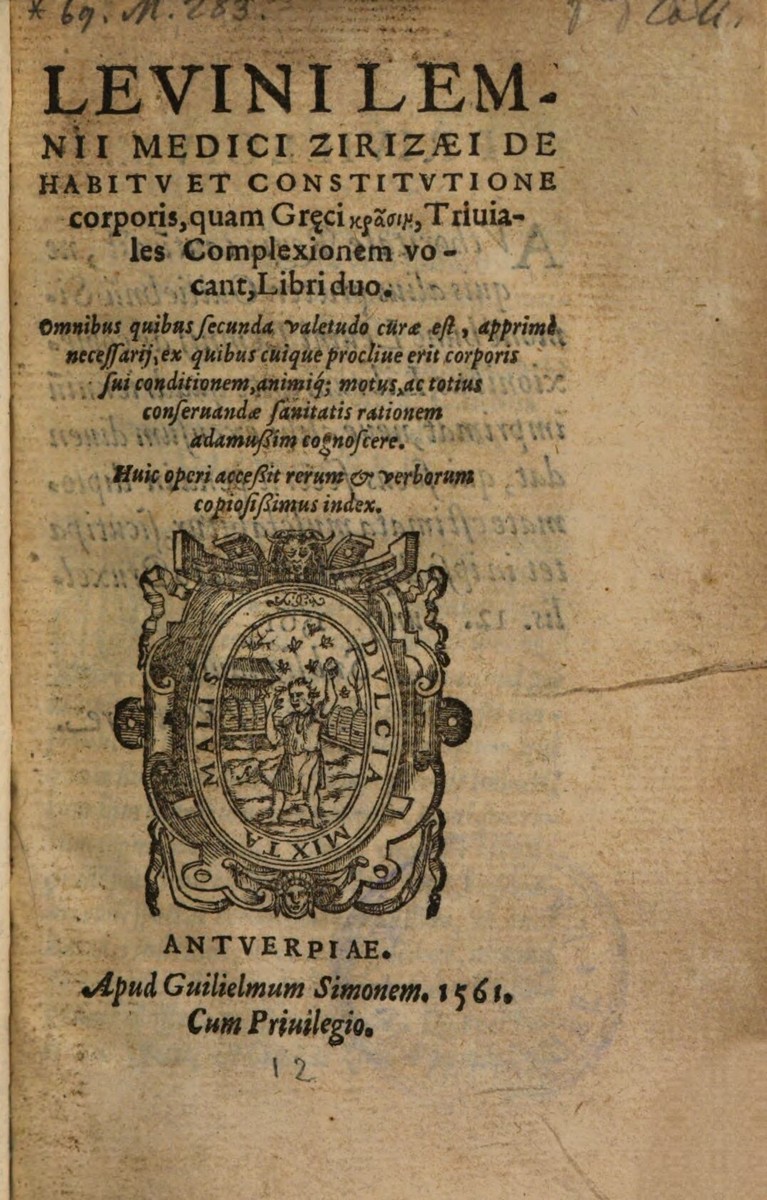Characteristics of Northern Bodies: Levinus Lemnius, Two Books on the Nature and Constitution of the Body, which the Greeks Call “krasis” and is Commonly Called “Complexion” (1561)
Abstract
In 1561, the Dutch physician Levinus Lemnius (1505–1568) authored De habitu et constitutione corporis, an extended Latin treatise on “complexion” or temperament (the individual humoral balance). The connection between humoral makeup and behavioral characteristics is particularly clear in the following excerpts, where Lemnius describes northern bodies (“those who have been exposed to the North wind and who live in cold regions”). While emphasizing northerners’ shared characteristics, Lemnius also draws distinctions between the Germans and the Dutch.
Source
[…]
And since the spirits that the humors exhale contain a foreign quality and cloud the brain, they also make people capricious and very easily enraged and their minds are shaken by other disturbances. Indeed, although the natural spirit is produced in the liver, it cannot be made pure, nor can it be weakened and made into an airy substance, unless the flesh is free from all sickness. Besides, the vital spirit, which spreads from the heart through the flow of the arteries to the entire body, originates and is produced from the natural spirit and leads to various habits according to its consistency or on account of its subtlety, which it derives partly from the person’s diet and partly from the air and the condition of the region. For those who have been exposed to the North wind and who live in cold regions appear bold, uncultured, formidable, wild, fierce, and instill terror in people with their fearsome voice and appearance, on account of their thick blood and dense spirits. Truly, when there is danger afoot, they tackle all things fearlessly and endure the chance of death with a cheerful and undaunted mood. This natural condition is lacking in people from Asia because they are soft and effeminate. They waver when even the slightest hazard threatens them, and they whine when exposed to the smallest feeling of pain and turn pale with fear.
[…]
Indeed, people with thick blood, which is made dense by the cold of the surrounding air, have stout and powerful spirits. Thus, they are relentless and their disturbances and assaults of the mind last longer and so they calm down more slowly. For this reason, most of them rise up more fiercely against their enemy when they are wounded and when they see blood, and they flare into battle more ardently. But people with thin blood have spirits that are weak and fade quickly. In fact, they are enraged more rapidly and are keen to start a fight, but their anger quickly subsides. When the first wound is inflicted and they see blood flowing, their mind falters and they faint. Yet to order and restrain the disturbances of the mind and to calm the great emotions that boil up from the passion and fury of the spirits seems to me a worthwhile thing for everyone to do––to examine if they are led somewhere by their spirit; by what power they are driven to action; and to what extent the mind’s agitations are fiery or gentle. Indeed, this is the way to return those things that are out of balance to temperance and moderation.
[…]
The Germans:
And the people whose spirits are imbued with a moderate coldness are constant and stable in the matters they attend to, and they approach everything with a determined mind. Because of this, they do not easily turn away from opinions they hold. However, on account of their coldness and faint heat, unless they have been educated industriously––and they started getting refined once upon a time––they have not been fine-tuned very much. They are not sophisticated, nor are they sly or cunning; they do not do anything stealthily or deceitfully to trick their enemies.
The Dutch:
And a moist spirit, provided it is moderate, gives those people who have it either from the condition of the region or from the quality of the air an easy and unhindered acceptance of ideas, but it is loose and will disappear before long, just as the figure and form of a thing cannot easily be imprinted on soft, watery wax. Therefore, they are forgetful and sleepy people, inept at learning skills. Their character is stupid and not at all clever and, since their bodies are fat and moist, their memory is less strong as intelligence itself must be constituted in extreme dryness.
[…]
Source: Levinus Lemnius, De habitu et constitutione corporis, quam Graeci Krasin triviales complexionem vocant, libri duo. Antverpiae: Simon, 1561, unpaginated (here: Complexionib. Lib. I). Available online at: http://data.onb.ac.at/rep/108F1819 (scans 44–46, 51)
Additional Source
Further Reading
The Touchstone of Complexions. Generallye applicable, expedient and profitable for all such, as be desirous & carefull of their bodylye health. Containing most easie rules & ready tokens, whereby euery one may perfectly try, and throughly know, as well the exacte state, habite, disposition, and constitution, of his owne body outwardly: as also the inclinations, affections, motions, of his mynd inwardle. First written in Latin, by Levine Lemnie, and now englished by Thomas Newton. London: Thomas Barth, 1576, pp. 13–17. Available online through Early English Books Online: https://www.proquest.com/books/touchstone-complexions-generallye-appliable/docview/2240917972/se-2?accountid=169695
